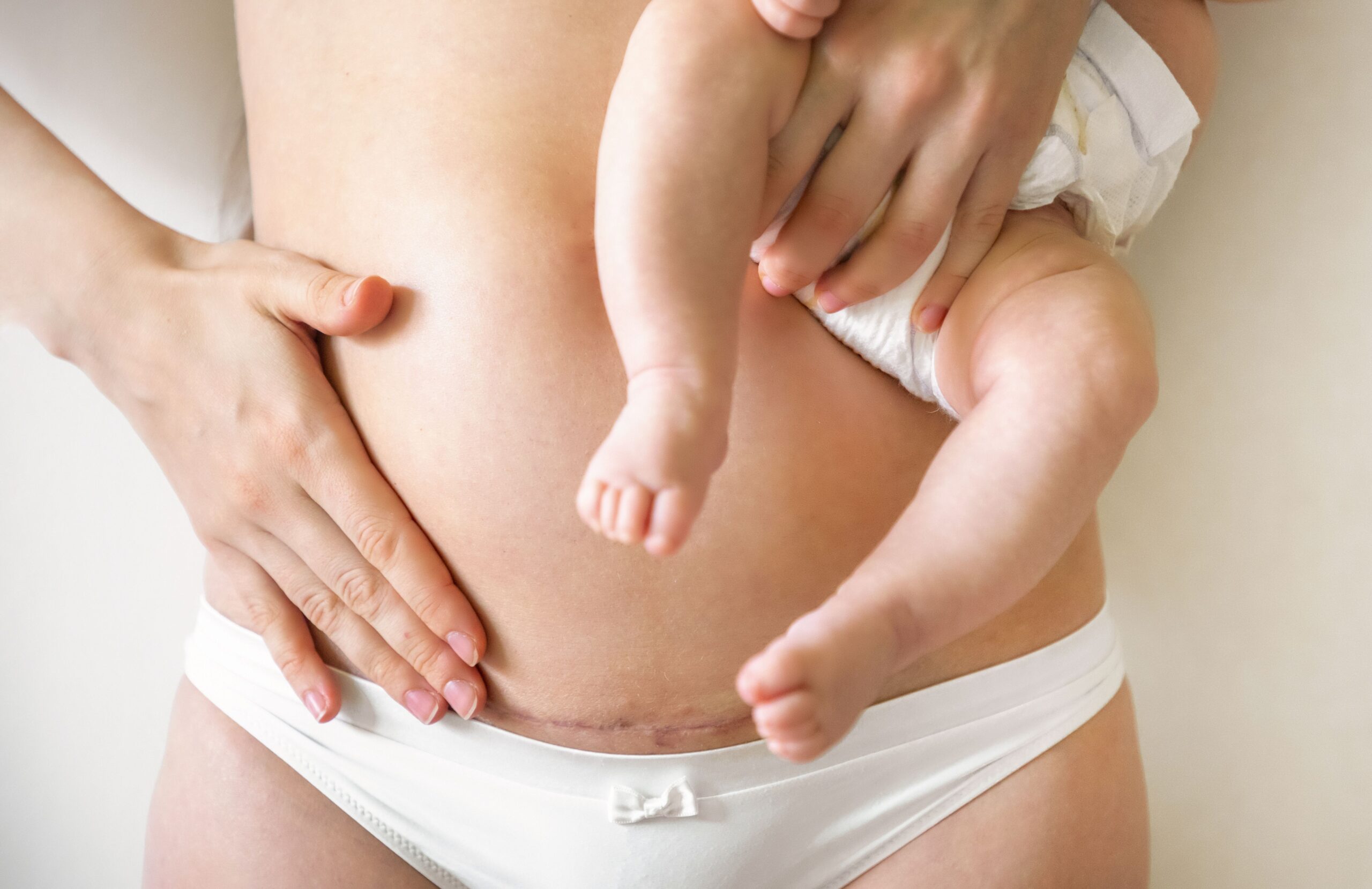The first 6 weeks of recovery after a C-section are very different when compared to the recovery from a vaginal birth. The reality of healing from a major surgery with a newborn, while also adjusting to postpartum body changes is likely to be challenging for mothers.
We can feel less overwhelmed if we are able to prepare ourselves and connect to communities of personalised support.
Surgical Incision
- Your caesarean wound will usually be along or just below your bikini line and will either have dissolvable stitches or staples covered with a dressing.
- Your first shower may feel intimidating and that is understandable, take your time and be careful not to scrub your incision, simply let soapy water run over it.
- Bruising, numbness or itching around your wound is common and it can take time for the different sensations to ease. Try to keep comfortable by wearing loose cotton clothing that doesn’t press or irritate your incision space.
- The acceptance of your scar is a personal journey and one that can be triggering or emotional. Be compassionate with yourself and seek professional support if you feel you need it.
Postpartum Bleeding
- Even though you’ve had a caesarean birth, you’ll still experience bleeding, clots and discharge. This is called lochia - a combination of leftover blood, mucus, and uterine tissue.
- Bleeding might be quite heavy in the first week and may also be heavy after exercise, when you first get up in the morning, and after breastfeeding.
- After the first week, your bleeding should gradually get lighter and change from red to dark-red to brown to yellowish-white.
Medications
- C-section pain typically spikes 18 hours after delivery and painkillers will be prescribed to help with your pain management.
- After a C-section, compression stockings need to be worn to minimise the risk of blood clots and to encourage healthy circulation.
- It is likely you will be prescribed a course of blood thinners to reduce the risk of blood clots forming.
Postpartum Hormones
Our postpartum hormones are magnificently orchestrated to support our body in its recovery and to establish an innate connection with our newborn.Due to medication received during surgery, there can be a delayed hormonal response within our body and it may need some time to ‘process’ that it has given birth. We can support our body to regulate by ensuring that we eat nutritional food, drink plenty of water and prioritise skin-to-skin with our newborn.
Microbiome (Mother and Baby)
Due to medications such as antibiotics, the microbiome within both our digestive system and our newborn baby’s, is likely to need some support in rebuilding healthy bacteria. This can be done by ensuring we are eating nutrient dense, warm foods, taking a probiotic and prioritising hydration with water and nourishing teas. It is common to experience bloating and swelling after a C-section and gas pains can be uncomfortable. This should pass within a week, once your bowels are moving normally again.
Breastfeeding
If you are planning to breastfeed, speak with your LMC about how medications may affect your milk supply.
Supportive feeding positions after your caesarean birth:
- Sitting with a pillow on your lap to support your baby and protect your wound.
- ‘Football’ hold - hold your baby under your arm with your baby’s feet towards your back. A pillow underneath your arm can help to support your baby's weight
Movement
- It may take time to trust your body to move as it once did.
- You will be encouraged to move around as soon as you can after your c-section.
- For the first 6-8 weeks, don’t lift any weight that’s heavier than your baby or anything that causes you pain. You will need help with any activities that involve stretching upwards, lifting or bending because of the strain these activities put on your wound.
- Physical activity helps with circulation and improves bowel function, A gentle walk each day can help your body and your mind feel better.
- Using your babies stroller to walk with can be a great form of support!
Mental & Emotional Recovery
You might feel fine about having a caesarean, or you might feel disappointed or sad that you weren’t able to give birth vaginally. If you had an unplanned (emergency) caesarean, the change in plan can sometimes be a shock. Birth is a huge time of transition for all women and it is important we talk through our birth story and find closure around our experience.
If you would like more support preparing for or recovering from you C-Section birth, Vanessa is available at Auckland Physiotherapy for appointments on Fridays and Saturdays.
'Click here' to book.

Recent Comments